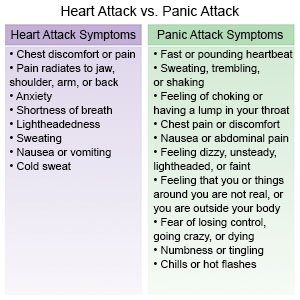Panic Attack in Children
Medically reviewed by Drugs.com. Last updated on Aug 4, 2025.
A panic attack usually lasts 10 to 20 minutes and feels more serious than it is. Help your child learn to calm down during an attack. Your child needs to know or realize that he or she is not in danger and that the attack will stop soon. Have your child breathe slowly and deeply during the attack. Deep breathing can help stop a panic attack or keep it from becoming severe.
 |
DISCHARGE INSTRUCTIONS:
Call your local emergency number (911 in the US) if:
Your child has any of the following signs of a heart attack:
- Squeezing, pressure, or pain in his or her chest
- and any of the following:
- Discomfort or pain in his or her back, neck, jaw, stomach, or arm
- Shortness of breath
- Nausea or vomiting
- Lightheadedness or a sudden cold sweat
Call your child's doctor or therapist if:
- Your child has new or worsening panic attacks after treatment.
- You have questions or concerns about your child's condition or care.
Related medications
Medicines:
- Medicines may be given to make your child feel more relaxed or to reduce anxiety that causes a panic attack. Some medicines are taken only when your child is having a panic attack. Other medicines can be taken to prevent panic attacks. Medicines are usually used along with therapy or other treatments.
- Give your child's medicine as directed. Contact your child's healthcare provider if you think the medicine is not working as expected. Tell the provider if your child is allergic to any medicine. Keep a current list of the medicines, vitamins, and herbs your child takes. Include the amounts, and when, how, and why they are taken. Bring the list or the medicines in their containers to follow-up visits. Carry your child's medicine list with you in case of an emergency.
Treatment options
The following list of medications are related to or used in the treatment of this condition.
Behavior therapy
can help your child learn to control how his or her body responds to stressful situations. A therapist may also teach your child ways to relax muscles and slow breathing during a panic attack. Your child may also learn ways to know that the panic attack will not get worse.
Help your child manage or prevent a panic attack:
- Help your child manage stress. Stress can trigger a panic attack. Help your child talk about the stress he or she feels. Offer support and encouragement. Your child may need help finding a solution to a problem. He or she may also just need to talk.
- Encourage your child to be physically active. Physical activity, such as exercise, can reduce stress and help your child sleep better. Children and adolescents should get at least 60 minutes of physical activity every day. Your child's healthcare provider can help you create an exercise plan.

- Set a sleep schedule. Too little sleep can increase anxiety. Have your child go to bed at the same time each night and wake up at the same time each morning. Keep your child's room quiet and free from distractions, such as a television or computer.
- Offer your child a variety of healthy foods. Healthy foods include fruits, vegetables, low-fat dairy products, lean meats, fish, and beans. Limit sugar. Sugar can increase your child's symptoms.

- Do not let your child have foods or drinks that contain caffeine. These include coffee, tea, soda, energy drinks, and chocolate. Caffeine can make anxiety worse or trigger a panic attack.
- Talk to your adolescent about not smoking. Nicotine and other chemicals in cigarettes and cigars can increase anxiety. Ask your adolescent's healthcare provider for information if he or she currently smokes and needs help to quit. E-cigarettes or smokeless tobacco still contain nicotine. Talk to your adolescent's healthcare provider before he or she uses these products.
Follow up with your child's doctor or therapist as directed:
Write down your questions so you remember to ask them during your visits.
© Copyright Merative 2025 Information is for End User's use only and may not be sold, redistributed or otherwise used for commercial purposes.
The above information is an educational aid only. It is not intended as medical advice for individual conditions or treatments. Talk to your doctor, nurse or pharmacist before following any medical regimen to see if it is safe and effective for you.
Learn more about Panic Attack
Treatment options
Care guides
Medicine.com guides (external)
Further information
Always consult your healthcare provider to ensure the information displayed on this page applies to your personal circumstances.
